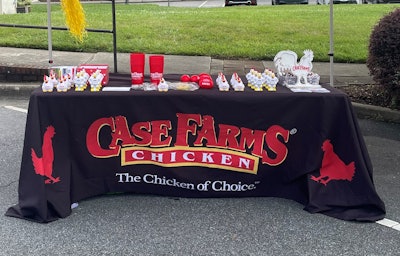
Communications between a Case Farms employee and a House of Raeford employee were not enough evidence to prove that Case Farms participated in an alleged conspiracy to limit the supply of chicken and drive up the price of chicken, a judge ruled.
In a recent decision in the U.S. District Court for the Northern District of Illinois, Judge Thomas M. Durkin cleared Case Farms, as well as five other poultry producers of those allegations brought against them in a series of class-action lawsuits.
In the lawsuits, plaintiff’s alleged that communications between Case and House of Raeford employees could be proof that a conspiracy among poultry producers occurred.
Plaintiffs brought to the court’s attention an email allegedly sent from a House of Raeford employee to a Case Farms employee, in which the House of Raeford employee allegedly typed “I can promise you that I won’t participate close to those numbers, in reference to prices being requested by a customer. The Case Farms employee allegedly responded, “Got it … we’re on the same page.”
“To the extent an agreement could be inferred from the comment about ‘being on the same page,’ the Raeford employee sends a follow-up email breaking the agreement a day later. This email chain is hardly evidence of agreement between Raeford and Case, let alone Case and the entire industry,” Durkin wrote.
Plaintiff’s pointed out other alleged communication between those two people, to which the House of Raeford employee’s message stated “supply is just a little better than demand,” and “one more round of cuts on placements would do the trick.”
Durkin deduced that an agreement about supply reduction could be inferred by the House of Raeford employee’s comments, but the Case representative did not respond.
“There must also be some supporting evidence corroborating Case’s participation in the conspiracy, and plaintiffs have none,” Durkin wrote.
Lovette’s comments, lack thereof, irrelevant
Plaintiff’s alleged in the lawsuit that comments from former Case Farms President and Chief Operating Officer Bill Lovette, after he was employed by Case Farms, could be proof of a conspiracy.
Lovette, who previously worked for Tyson Foods, was employed by Case Farms from 2008 through 2010. Following that, he accepted a new job as the CEO of Pilgrim’s Pride.
During a quarterly earnings call in 2012, Lovette said he was “comfortable” that the industry would “remain constrained,” and the plaintiffs used that as evidence. However Durkin stated: “This is a public statement about the state of industry when Lovette worked for Pilgrim’s. It does not mention Case and is irrelevant to whether Case agreed to conspire with other defendants.”
The plaintiffs also alleged that during court proceedings Lovette, who was being criminally investigated for charges of bid rigging during his time with Pilgrim’s Pride, invoked the Fifth Amendment and refused to answer questions about his work for Case Farms. (Lovette was eventually found not guilty of those charges.)
“That criminal case was only tangentially related to the allegations in this case. It is not a basis for an adverse inference against Case,” Durkin wrote.
Other companies to be cleared by Durkin include: Agri Stats, Perdue Farms, Foster Farms, Fieldale Farms, Claxton Poultry and Wayne Farms.











